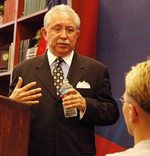The Bell monopoly is the most
destructive economic roadblock of our time.
It has caused the United States to fall
behind the rest of the world
in broadband.
And now
these same monopolists are threatening to make things worse by favoring
specific Web providers over others, eliminating the network
neutrality agreement that has allowed the Internet to grow.
They have to be stopped, now.
This monopoly is identical, in its
impact, to the
robber barons of the 1880s
whose depredations gave rise to Populism and the first government regulations. (This book on the original robber barons available at Amazon.Com, despite being 44 years old.)
In this case, however, we are taking
about something more pernicious. That’s partly because these
monopolists are already, supposedly, regulated, on both the federal
and state level. These forums have been manipulated so they actually
support the monopoly, and subsidies meant to improve service to
under-served areas are simply pocketed by the monopolists.
Which brings me to the main point
today, which is how both the urban and rural poor are manipulated to
maintain the monopoly.
The short answer is they’re bought off.
It’s easy to see what’s in this for the sellers. For minority
legislators, the speed of the broadband service available to the
community is not a big issue. Competition is not a high priority. In
rural areas, just having service is the priorit
y – the idea that
they might have multiple vendors is not considered. In both these
areas, the answer to service people can afford is said to be subsidy,
not competition.

to services and lower-cost service to urban areas come in various
forms, but the most popular are the so-called Universal Service Fund and E-Rate for schoools,,
disparaged as the Gore Tax
in the 1990s but now and essential element in subsidizing the Bell
monopoly.
Under the law, Bell companies have
first call on all these revenues. They are supposed to improve
service with them. In fact, they pocket them, and use their monopoly
status to keep competitors out. For instance, it would be much, much
cheaper for a school to have a single access line and 802.11 wireless
throughout the building. Instead, Bells force schools to buy
expensive T-1 lines (the government subsidy makes them the cheap
choice for the schools) and then create a wired network.
The broken promises of the Bells
designed to gain rate hikes on the promise of fiber have been
detailed extensively here, and in the $200 Billion Scandal by Bruce
Kushnick. This is
continuing, unabated. And no one in any legislator is talking
seriously about ending the fraud or bringing competition to the
broadband arena.
On to some specifics.
A December 5
Broadcasting & Cable story describes how an organization of black legislators are
supporting Bell moves against net neutrality. (The President of the group, a lady from Mississippi, is at left.) What isn’t mentioned is how much money
Verizon contributes directly to the organization sending out this
press release.
Or
its sponsorship of the man in charge of handling the group’s grant
proposals.
Or its subsidy of a “marketing” company, Mickey Ibarra
& Associates (Ibarra, a former Clinton Administration official, is pictured below),
to funnel money toward minority politicians, including its creation
of a report for the black legislators on which their stand is based.
Note this carefully. Verizon gives the
group money. Verizon pays for the research on which its conclusions
are based. Verizon works, through a third party, to funnel
“contributions” into the community.
But wait there’s more. Verizon uses its
ties to groups like this in filling out its own executive ranks. Its
new President for Maryland
is a former member of the group that has endorsed its gutting of net
neutrality. In fact the group proudly lists Verizon as among its top
“corporate contributors”
Is there any question, then, that the
support of black legislators is bought-and-paid-for by the
monopolists? The legislators are selling out a low priority to
maintain power. Verizon is paying a relative pittance to make
government dance to its tune.
And American competitiveness suffers.
This is the kind of issue open source politics was built for. These are the kind of personal and financial links that just did not see the light of day when you had to pay the costs of print or TV time. But with the Internet, they are available. And so is the means to disseminate it to everyone who cares how slow their broadband is, and how high its price is. And so is the means to activate that base, and point them in the direction of reform.














You’re all over the map with this one. Where to even start? What is the population density of South Korea versus the United States. South Korea is 2/3 the size of California with 50% more people (48 million). About 10 million live in Seoul, giving it a population 3x that of Los Angeles (city). From that fact alone, it sounds like you really have a beef with Americans who prefer detached homes and yards with driveway and street parking. Less density makes it much more expensive to wire everyone up with fast wires.
The article you cite says that South Korea broadband is 100x as fast as dialup. Doing the math, that looks like 5.6 Mbps to me, which is comparable to what cable modem downstream typically reaches in sunbelt suburbs now.
And then you go off into one of your typical passive aggressive “the blacks are off the plantation” rants, with the unambiguous implication that they were dumb enough to be bought. There truly is nothing funnier than a white liberal calling blacks who don’t agree with him on a policy wonk level issue “ingrateful”. Well, OK, Pat Robertson pitching network neutrality is funnier, for what it says of the mentality of the whole pro-regulation crowd. Anyway, keep going with this and you might make it into Borat 2.
You’re all over the map with this one. Where to even start? What is the population density of South Korea versus the United States. South Korea is 2/3 the size of California with 50% more people (48 million). About 10 million live in Seoul, giving it a population 3x that of Los Angeles (city). From that fact alone, it sounds like you really have a beef with Americans who prefer detached homes and yards with driveway and street parking. Less density makes it much more expensive to wire everyone up with fast wires.
The article you cite says that South Korea broadband is 100x as fast as dialup. Doing the math, that looks like 5.6 Mbps to me, which is comparable to what cable modem downstream typically reaches in sunbelt suburbs now.
And then you go off into one of your typical passive aggressive “the blacks are off the plantation” rants, with the unambiguous implication that they were dumb enough to be bought. There truly is nothing funnier than a white liberal calling blacks who don’t agree with him on a policy wonk level issue “ingrateful”. Well, OK, Pat Robertson pitching network neutrality is funnier, for what it says of the mentality of the whole pro-regulation crowd. Anyway, keep going with this and you might make it into Borat 2.